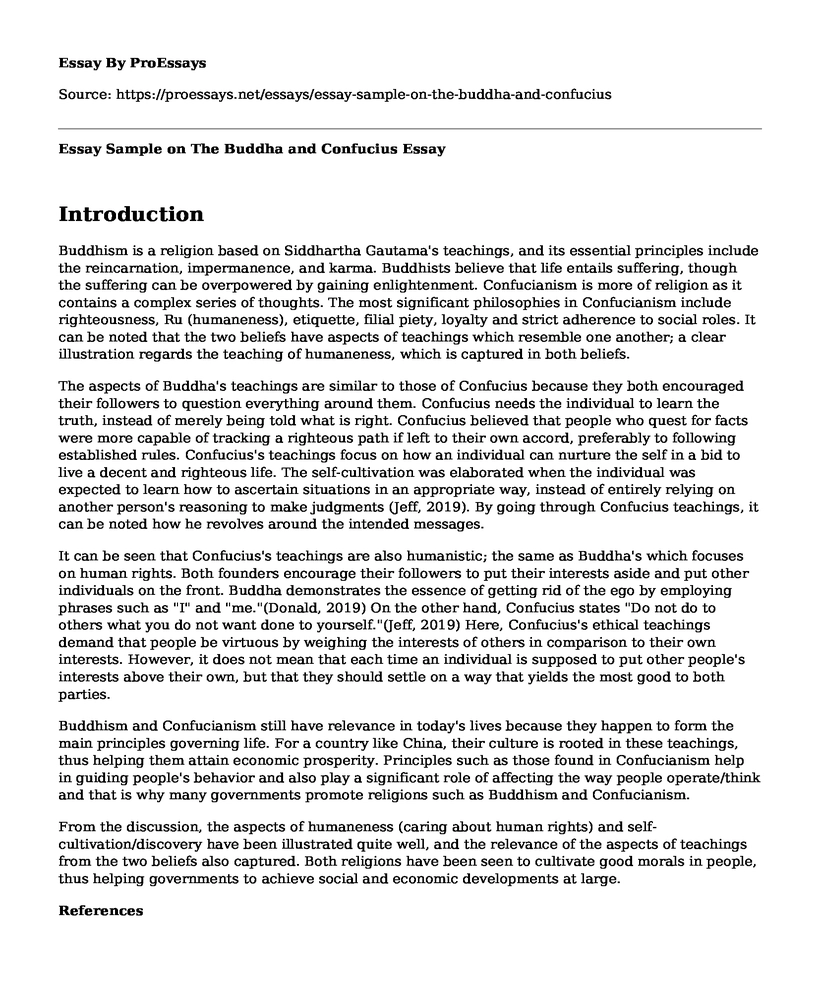Introduction
Buddhism is a religion based on Siddhartha Gautama's teachings, and its essential principles include the reincarnation, impermanence, and karma. Buddhists believe that life entails suffering, though the suffering can be overpowered by gaining enlightenment. Confucianism is more of religion as it contains a complex series of thoughts. The most significant philosophies in Confucianism include righteousness, Ru (humaneness), etiquette, filial piety, loyalty and strict adherence to social roles. It can be noted that the two beliefs have aspects of teachings which resemble one another; a clear illustration regards the teaching of humaneness, which is captured in both beliefs.
The aspects of Buddha's teachings are similar to those of Confucius because they both encouraged their followers to question everything around them. Confucius needs the individual to learn the truth, instead of merely being told what is right. Confucius believed that people who quest for facts were more capable of tracking a righteous path if left to their own accord, preferably to following established rules. Confucius's teachings focus on how an individual can nurture the self in a bid to live a decent and righteous life. The self-cultivation was elaborated when the individual was expected to learn how to ascertain situations in an appropriate way, instead of entirely relying on another person's reasoning to make judgments (Jeff, 2019). By going through Confucius teachings, it can be noted how he revolves around the intended messages.
It can be seen that Confucius's teachings are also humanistic; the same as Buddha's which focuses on human rights. Both founders encourage their followers to put their interests aside and put other individuals on the front. Buddha demonstrates the essence of getting rid of the ego by employing phrases such as "I" and "me."(Donald, 2019) On the other hand, Confucius states "Do not do to others what you do not want done to yourself."(Jeff, 2019) Here, Confucius's ethical teachings demand that people be virtuous by weighing the interests of others in comparison to their own interests. However, it does not mean that each time an individual is supposed to put other people's interests above their own, but that they should settle on a way that yields the most good to both parties.
Buddhism and Confucianism still have relevance in today's lives because they happen to form the main principles governing life. For a country like China, their culture is rooted in these teachings, thus helping them attain economic prosperity. Principles such as those found in Confucianism help in guiding people's behavior and also play a significant role of affecting the way people operate/think and that is why many governments promote religions such as Buddhism and Confucianism.
From the discussion, the aspects of humaneness (caring about human rights) and self-cultivation/discovery have been illustrated quite well, and the relevance of the aspects of teachings from the two beliefs also captured. Both religions have been seen to cultivate good morals in people, thus helping governments to achieve social and economic developments at large.
References
Donald S., Lopez F.E., Reynolds D., Llewelyn S., Giuseppe T., Joseph M. & Kitagawa H.N., (2019). Buddhism. Religion, 1-10.
Jeff R., (2019). Confucius, Berea College, 1-12.
Cite this page
Essay Sample on The Buddha and Confucius. (2022, Nov 25). Retrieved from https://proessays.net/essays/essay-sample-on-the-buddha-and-confucius
If you are the original author of this essay and no longer wish to have it published on the ProEssays website, please click below to request its removal:
- Understanding Islam
- Does God Exist?
- The Idea of God in Christianity Orthodox in the USA - Paper Example
- Essay Sample on Hebrews With the Issue of Marriage
- Essay Example on Creating Lasting Change Across Borders: My Service Project
- Overview of the Life of Buddha Essay
- 21st Century Challenges to Christian Growth - Essay Sample







